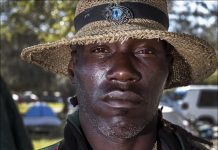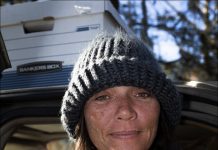By Edysmar Diaz-Cruz
Published July 20, 2020

GAINESVILLE, Fla. — The nightmare began almost a year ago when Tatiana Garcia skipped school.
Scared to face scheduled tests, she instead spent the day at a Boca Raton mall and then headed to the beach with her friends. When she came home, her parents put her on lockdown. Upset, Garcia packed her belongings and left.
“I begged her not to,” says her mother, Laurie Garcia. “But she was hell-bent on doing it.”
So began Tatiana Garcia’s brush with homelessness.
She floated from friend to friend, her parents refusing to let her return home unless she obeyed their stringent house rules. That included prioritizing school over socializing. Garcia felt smothered. She refused to comply and found herself briefly sleeping under the stars in a tent that rustled in the cold wind.
Laurie anxiously answered unknown numbers on her phone, hoping it was her daughter. She was shocked when her “Love Bug” said during a call that she thought she was walking among felons, possibly sex offenders and convicted murderers.
On some days that they connected on the phone, Garcia cried. Laurie held back her own tears as she comforted her. On other days, Garcia consoled her mother, insisting she was doing OK.
Garcia was not ready to go back home and live under her parents’ thumb. She preferred her freedom.
She alternated her nights between the dorms of Gainesville’s largest homeless shelter, GRACE Marketplace, and the tents of the Dignity Village encampment just outside of the shelter’s compound.
At 19, Garcia had to learn how to fend for herself for the first time. She quickly observed the rules of the streets: don’t ask for people’s real names, and not everyone is a friend.
“Once I moved out, it was kind of a rite of passage,” she says. “But it was really scary — I saw a lot of violence; how another human can hurt someone.”
Garcia stood out amid the other homeless residents. Her rounded cheeks gave away her youth. She was talkative and liked to crack jokes. She memorized the layout of the tent city — where the safest place was to hang out and who to stay away from. Her confidence grew.
She experimented with drugs. After taking a drag from what she believed to be pot, Garcia’s head drooped as she came in and out of consciousness. Later, she suspected that her marijuana was laced with a stronger, more dangerous street drug.
She witnessed a man overdose on spice, a cheap synthetic marijuana popular among homeless drug users. The man’s body went limp, all sign of life escaping him. Garcia trembled at the sight, and a bystander had to pull her away from the horror.
She vowed to never accept drugs from a stranger again.
“I was very sheltered growing up,” Garcia says. “I was a silver spoon baby.”
When she was 8, Garcia asked for a rainbow-themed room. Her parents painted it pink, purple and sky blue. The bedroom remains exactly how she left it.
As a nurse, Laurie always chose to work the night shift so she could be home with her daughter during the day. Garcia tagged along on her mom’s errands. Laurie sat down to do homework with Garcia. They did everything together.
“I just miss hanging out with her. Her presence,” Laurie says. “She always liked being around people.”
That’s why it was even harder for Laurie to accept Garcia’s misfortunes. That’s why she was unimaginably relieved to learn one day that Garcia was on her way to upstate New York.
Garcia had managed to connect through Instagram with her uncle, who agreed to take her in at his home in New York. She took advantage of an opportunity that GRACE offers its residents — a one-way Greyhound bus ticket for $160 and an Uber ride from the shelter to the station.
Once again, Garcia packed her belongings, though she didn’t carry much. With the clothes on her back, one little bag and a heart full of trepidation, she climbed onto the bus.
“I wanted to help everybody else and save them,” Garcia says, thinking about all the people she met during her week in the homeless encampment.
She felt tears well in her eyes. She knew this was her chance to escape; that few were afforded this opportunity. Laurie had desperately wanted Garcia to return home to South Florida. But at least her daughter had escaped homelessness.
As Garcia made her way up the East Coast, she could only think about the distance she was putting between herself and life as she knew it — her parents, her dog, Maxie, and the warmth of Florida. Yes, she was scared. But she was ready for a new life. One, she hoped, that would be better.





